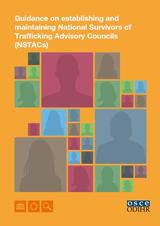- Home
- About us
-
Our work
- Elections
- Civil society
- Rule of law
- Democratic governance
- Legislative support
- Freedom of religion or belief
- Freedom of peaceful assembly
- Gender-based violence
- Human rights defenders
- Human rights and new technologies
- Human rights and gender-responsive security sector
- Human rights and anti-terrorism
- Migration and freedom of movement
- National human rights institutions
- Torture
- Trafficking in human beings
- Hate crime
- People with disabilities
- Racism, xenophobia and discrimination
- Roma and Sinti
- Gender equality
- Special meetings
- News
- Events
- Resources
Guide / manual / handbook

Guidance on establishing and maintaining National Survivors of Trafficking Advisory Councils (NSTACs)
This guidance provides practical information for OSCE participating States on how to establish and structure National Survivors of Trafficking Advisory Councils (NSTACs).
Across the globe, human trafficking remains a low-risk, high-profit crime. No country can claim they keep pace with the domestic and transnational trafficking crimes committed on their territory. Traffickers are continuously diversifying their ‘business models’, presenting serious challenges for law enforcement. For effective and sustainable trafficking prevention strategies there must be cooperation between multi-agency and multidisciplinary stakeholders. Survivor Leader bodies and councils are already active in many fields of anti-trafficking. Their central involvement is increasingly recognized as fundamental both to preventing and combating human trafficking and to protecting the human rights of victims and survivors.- Date:
- Source:
- OSCE Office for Democratic Institutions and Human Rights
- Publisher:
- Organization for Security and Co-operation in Europe
- Our work:
- Combating trafficking in human beings